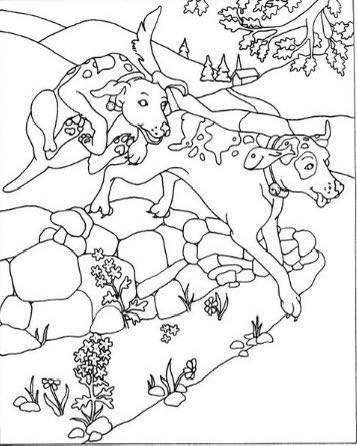The Joyful Play of Dogs: How Their Bond with Nature Enriches Our Lives
Dogs have long been celebrated as “man’s best friend,” and it’s easy to see why. Their boundless energy, unwavering loyalty, and playful spirits bring a unique joy into our lives. There’s something magical about watching two dogs run freely through fields, chase each other across sunlit meadows, or splash through a stream with pure delight. These moments capture not just the joy of play, but the profound connection dogs share with nature—and how this connection enriches their lives and ours. In this article, we’ll explore why dogs thrive outdoors, the benefits of their interaction with nature, and how these experiences nurture their emotional, mental, and physical well-being.
The Joy of Play: Dogs and Their Natural Instincts
For most people, the image of a dog conjures up memories of happy moments: a golden retriever chasing a ball, a border collie darting through a field, or a curious puppy sniffing around a wooded trail. Dogs are, by nature, energetic creatures, and outdoor play allows them to express their instincts freely.
Play as an Essential Instinct
From the moment a puppy opens its eyes, the instinct to play begins to emerge. Early playtime with littermates isn’t just fun—it’s vital. Puppies learn social cues, boundaries, and coordination through playful interactions. They discover how to communicate, negotiate, and even regulate their energy levels.
As dogs grow, play remains a cornerstone of their development. Whether it’s chasing a stick, leaping over puddles, or exploring new terrain, these activities are crucial for keeping their minds sharp and their bodies agile. Play is more than entertainment—it’s a natural expression of their physical and mental needs.
Physical and Emotional Benefits of Outdoor Play
Dogs seem happier when outside for a reason. Outdoor play delivers benefits that go beyond a wagging tail or a joyful bark—it supports their entire well-being.
Improved Physical Health
Running, jumping, and exploring outdoors offers essential exercise for dogs. Like humans, they require physical activity to maintain a healthy weight, strong muscles, flexible joints, and cardiovascular health. Uneven terrain, streams, hills, and forest trails provide a full-body workout far superior to repetitive indoor activities. This variety of movement keeps dogs fit, coordinated, and resilient.
Mental Stimulation
The outdoors is a sensory wonderland for dogs. New smells, sounds, and sights challenge their minds and prevent boredom. This mental engagement is vital for reducing anxiety, preventing destructive behavior, and encouraging problem-solving. When dogs navigate a rocky path, discover hidden objects, or encounter new creatures, they sharpen their instincts and keep their minds active.
The Bond Between Dogs and Their Owners
Outdoor play isn’t just about dogs—it’s about the shared experiences that strengthen the bond between pet and human.
Quality Time Together
Taking your dog outside for playtime fosters connection and trust. Whether it’s a simple game of fetch in the backyard or an adventurous hike through the woods, these shared experiences create lasting memories. Dogs thrive on attention and companionship, and these moments of play nurture a sense of belonging and emotional closeness.
Strengthening Communication and Trust
Play also improves understanding between dogs and their owners. Through interactive games, dogs learn to respond to commands and pick up subtle cues. Teaching a dog to navigate obstacles or retrieve an object reinforces training in a positive, enjoyable way. Play encourages mutual respect, patience, and cooperation.
Socialization: Dogs and Their Playmates
Dogs are social animals. Interaction with other dogs during outdoor play is equally important, providing opportunities for social learning and emotional growth.
Developing Proper Social Skills
Through play, dogs learn to share space, interpret body language, and respond appropriately to peers. Puppies, especially, benefit from early socialization, gaining skills that reduce fear, aggression, and territorial behavior. Dogs that regularly interact with others are more adaptable, confident, and empathetic in group settings.
The Value of Dog Parks and Playgroups
Dog parks, neighborhood walks, and organized playgroups offer a safe space for social engagement. These settings provide physical exercise, mental stimulation, and the opportunity to form friendships. Social play supports emotional health and helps dogs develop well-rounded personalities.
Dogs and Their Connection to Nature
Dogs have an instinctual bond with the natural world. Time spent outdoors allows them to express primal behaviors, engage their senses, and feel fully alive.
Returning to Their Roots
Chasing, digging, exploring—these behaviors are not just play, they’re an expression of a dog’s heritage. Outdoor environments allow dogs to tap into instincts that modern life often suppresses. This connection provides a sense of fulfillment and well-being.
The Healing Power of Nature
Exposure to sunlight, fresh air, and open spaces improves mood and reduces stress for dogs, just as it does for humans. Nature enriches their lives, promoting calmness, curiosity, and emotional balance. A simple walk through a forest or a romp on a beach can rejuvenate their spirits and create moments of pure joy.
Conclusion: Celebrate Outdoor Play
The sight of dogs running, playing, and exploring together in a natural setting is a reminder of life’s simple joys. Outdoor play supports their physical fitness, mental health, social skills, and emotional well-being. It strengthens bonds between dogs, owners, and other animals, while nurturing a profound connection with nature.
So next time you step outside with your furry friend, remember: every chase, leap, and sniff in the great outdoors is a gift. Play freely, explore together, and let nature be the backdrop to a life full of joy, growth, and companionship—for both you and your dog.
